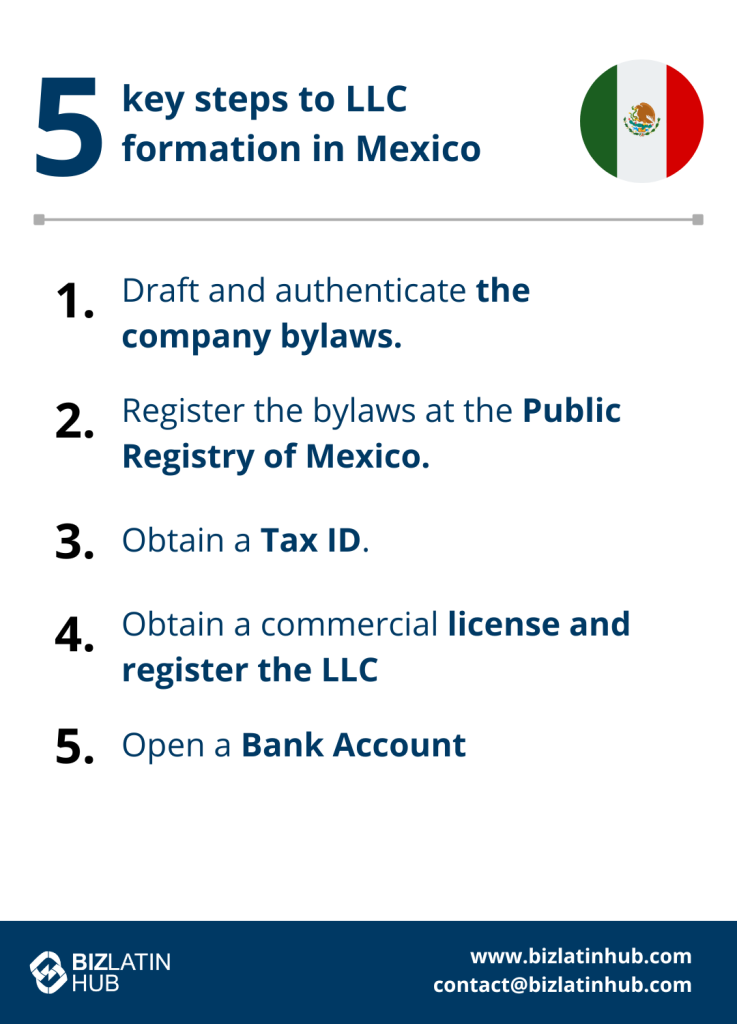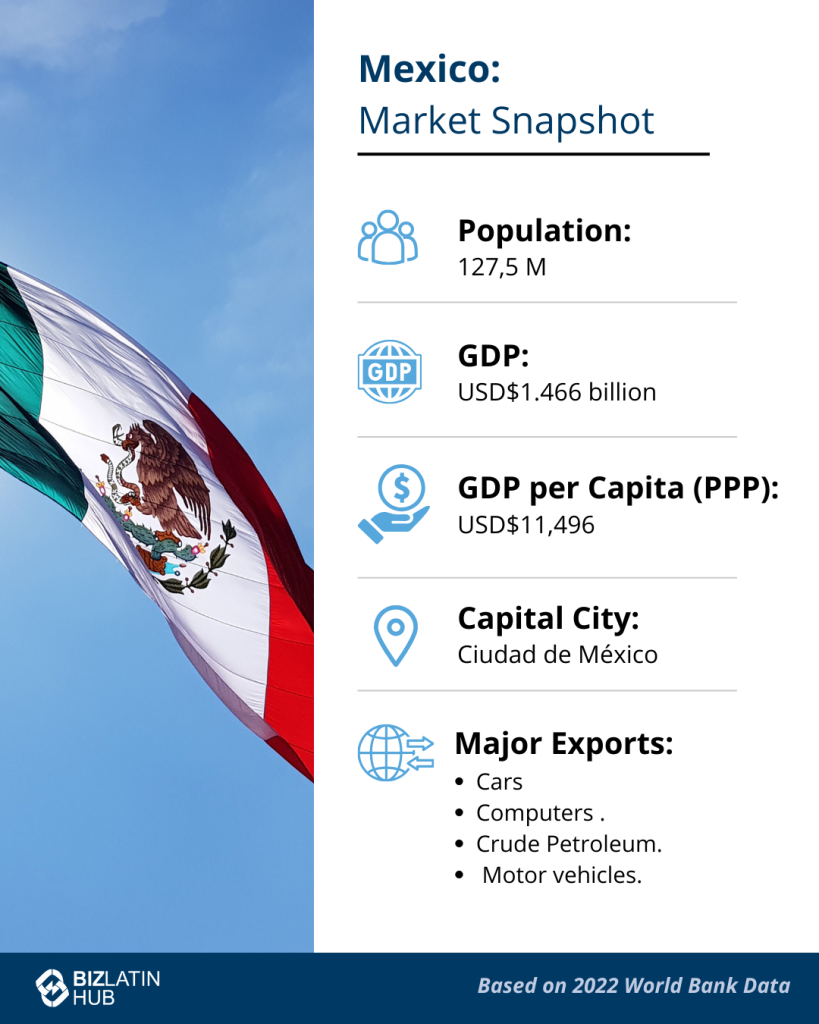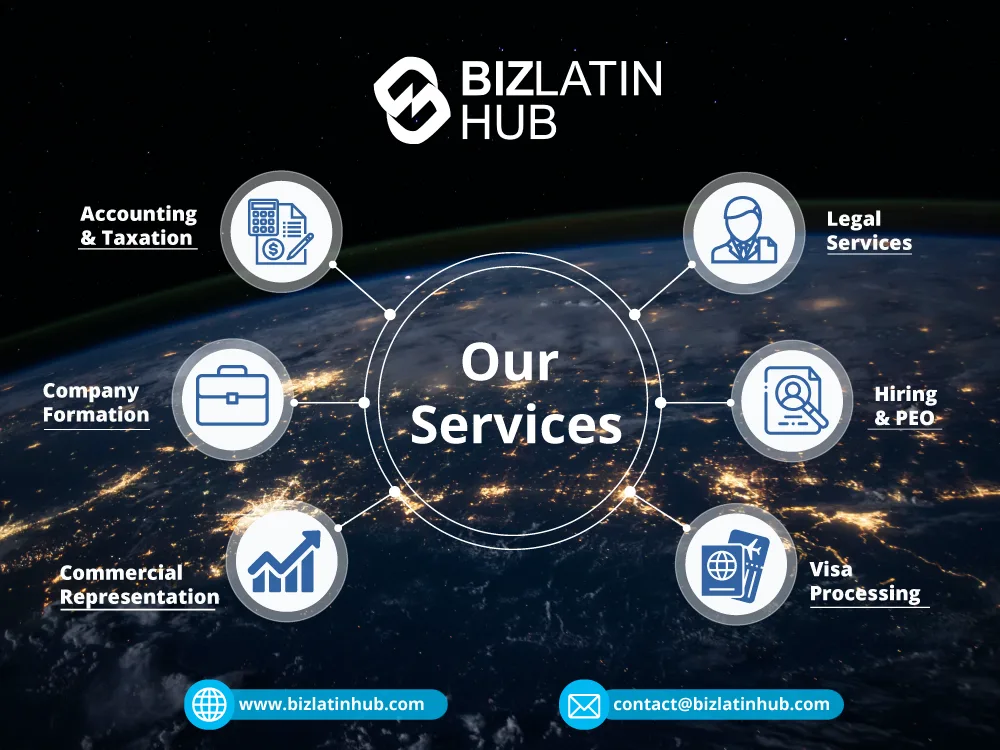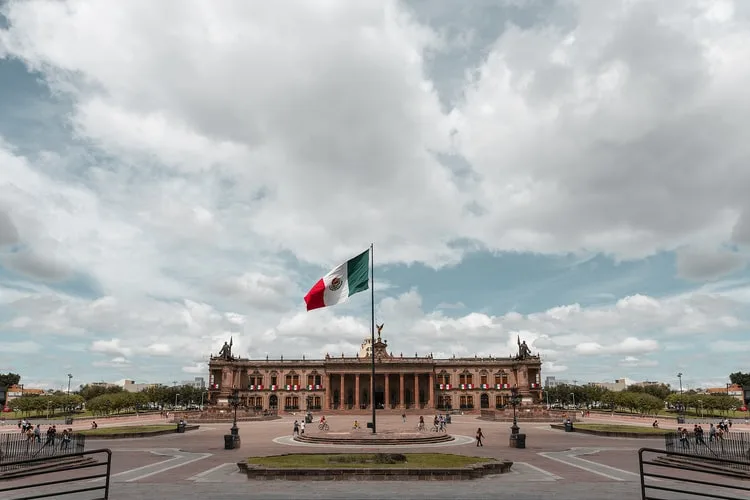LLC formation in Mexico, commonly known as a Sociedad de Responsabilidad Limitada (S. de R.L.), is favored by foreign investors venturing into Latin America’s second largest economy, and for good reason. In addition to being a quick and simple process, LLC formation in Mexico offers a number of additional advantages.
One notable benefit is its accessibility to individuals or corporations of any nationality, using capital declared in any currency. In addition, the requirement of only two shareholders and a minimum share capital of only a few hundred U.S. dollars makes the LLC formation in Mexico very inclusive, as it accommodates a wide range of investors. In addition, the liability of the shareholders is limited to their capital investment, providing a level of protection and security that is conducive to business growth and expansion. As a result, forming an LLC in Mexico emerges as an attractive option for investors looking to establish themselves in the country’s dynamic and prosperous economic landscape.
If you are interested in LLC formation in Mexico, read on to understand the five steps in the process, as well as getting some insight into the Mexican market.
5 key steps to LLC formation in Mexico
While you will want to seek out the assistance of a good corporate lawyer in Mexico to guarantee that the process runs smoothly
To start your process to form an LLC in Mexico you must follow these 5 steps:
- Step 1 – Draft and authenticate the company bylaws.
- Step 2 – Register the bylaws at the Public Registry of Mexico.
- Step 3 – Obtain a Tax ID.
- Step 4 – Obtain a commercial license and register the LLC with the municipality.
- Step 5 – Complete LLC formation in Mexico by opening a bank account.

Step 1: Draft and authenticate the company bylaws
The first step towards LLC formation in Mexico is the drafting and authenticating of the company bylaws, which will include the likes of the company structure and the focus of the business, as well as details of its shareholders and assets. Authentication comes by registering the documentation before a notary public.
Step 2: Register the bylaws at the Public Registry of Mexico
When you register the authenticated bylaws at the Public Registry of Mexico, that body will do a careful review to guarantee that all aspects of the statues included are in keeping with Mexican law. Once those bylaws are approved, your LLC formation in Mexico will be considered legally registered and will be governed by Mexican laws.
Step 3: Obtain a Tax ID
With your LLC formation in Mexico now registered, you will need to obtain a tax identification number from the Federal Taxpayer Registry (Registro Federal de Contribuyentes; RFC), with your tax obligations governed by the nature of your business.
Step 4: Obtain a commercial license and register the LLC with the municipality
After registering your LLC at the federal level and applying for a tax ID, you will need to obtain a commercial license and register the entity with the municipality where it will be based. Like at the federal level, this process will involve specifying what your commercial activities entail.
Step 5: Complete LLC formation in Mexico by opening a bank account
The final step to complete LLC formation in Mexico is to open a corporate bank account, which will involve presenting the following documentation:
- Copy of passport or ID of all shareholders.
- A document verifying shareholders’ residence addresses.
- Proof of income or a copy of income tax return, financial statements, or employment reference letter.
Your legal representative in Mexico will be able to advise you on whether a particular bank account provider is best suited to your needs, based on the nature and location of your business.
When considering LLC formation in Mexico, various types of corporate bank accounts become essential. As part of the LLC formation process, it’s prudent to explore Business Savings Accounts that provide interest-bearing options for surplus funds, bolstering financial stability. For efficient financial management post LLC formation, opt for Business Checking Accounts, facilitating check issuance and electronic transactions.
Especially relevant during LLC formation, Foreign Trade Accounts streamline international transactions, ensuring adherence to import and export regulations. Lastly, during the critical phase of LLC formation, businesses can benefit from Escrow Accounts, securing funds for contractual arrangements. By selecting the right account types during LLC formation in Mexico, companies can establish a solid financial foundation to support their growth.
How Does the Market Look for Forming an LLC in Mexico?
Mexico boasts the second-largest economy in Latin America based on gross domestic product (GDP), behind only Brazil. While GDP has fluctuated, it has continued on a generally upward trajectory, increasing almost six-fold in the three decades after 1989 to hit 1.41 trillion in 2022, following three years of strong growth (all figures in USD).
The country’s increase in GDP has been met by a concomitant rise in prosperity, with gross national income hitting $10,210 per capita in 2022 — a figure that placed the country as an upper-middle income nation based on classifications established by the World Bank.

Mexico is a major trade hub in the Americas, with high-volume ports serving both the Pacific Ocean and the Gulf of Mexico, and the country is the 17th-largest exporter in the world. Meanwhile more than $1.7 billion of goods transit its 3,145 km (1,954 mile) border with the United States every day.
Businesses based in Mexico benefit from preferential access to the massive US and Canadian markets thanks to the United States-Mexico-Canada Agreement (USMCA) — a free trade arrangement signed in 2018 to replace the North American Free Trade Agreement (NAFTA) and which came into force in 2020.
Mexico also has a slew of FTAs in place with major economies from around Latin America, as well as Japan, while it is also a founder member of the Pacific Alliance — a ten year old economic integration initiative that also includes Chile, Colombia, and Peru, and which has ambitions to extend beyond the Western Hemisphere.
While Mexico’s agricultural sector only accounts for less than 4% of GDP, fresh produce such as corn, tropical fruits, and vegetables are major export products. Meanwhile, the country has a highly developed manufacturing sector accounting for more than 30% of GDP, with computers, medical equipment, and vehicles among the most important goods exported.
However, the services sector is the most important economically, generating more than 60% of GDP. While the country is home to a growing professional services industry, it also boasts considerable development in IT and technology, and is a major hotspot for innovation and tech outsourcing.
All of these factors contribute to make LLC formation in Mexico popular and the Mexican market one of the top destinations for foreign direct investment (FDI) in Latin America, with more than $38.59 billion in FDI inflows registered in 2022.
Biz Latin Hub can help with LLC formation in Mexico
At Biz Latin Hub, our team of experienced company formation agents is equipped to help you enter the Mexican market and take advantage of the country’s business opportunities. With our complete portfolio of corporate legal, accounting, and back-office services, our multilingual team is equipped to deliver excellence and ensure the success of your LLC formation in Mexico. We also operate in 17 other jurisdictions around Latin America and the Caribbean.
Contacts us now for personalized assistance or a free quote.
Learn more about our team and expert authors.





